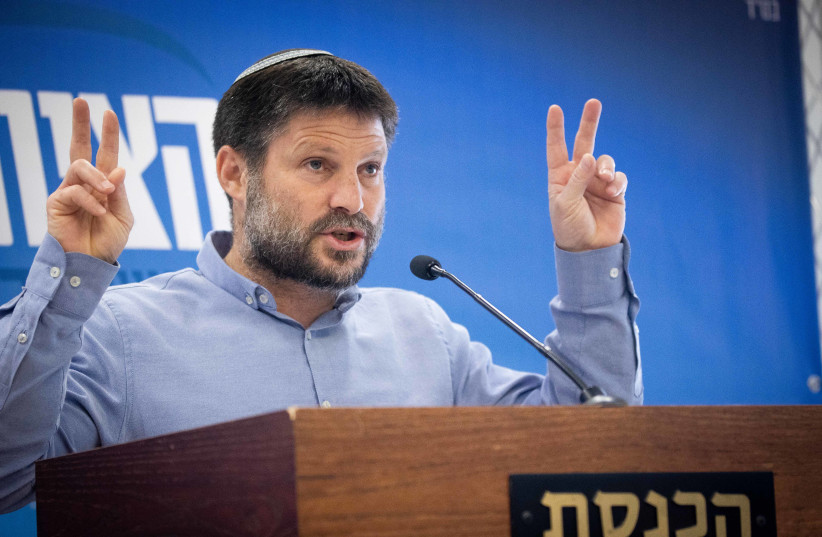Extensive Israeli government investments in the country’s Arab minority are in peril. Any cutback, or outright revocation, of established national plans to narrow longstanding gaps between the country’s Jewish and Arab citizens, with the latter comprising 21% of the population, could set back significant achievements over the past decade.
Finance Minister Bezalel Smotrich’s recent initial decision to stop the disbursement of NIS 200 million to Arab municipalities was one of the more public efforts to date to withhold allocations in government-approved plans to improve the status of Arab citizens in many facets of Israeli society.
Prime Minister Benjamin Netanyahu oversaw the adoption in 2015 of the first-ever five-year economic development plan for Israeli Arabs. The NIS 15 billion plan, known as Government Resolution 922, produced significant advancements for Arab citizens in higher education, employment, education, housing, and transportation.
Key to these efforts was Aiman Seif, who was the first director of the Authority for the Economic Development of the Arab Sector, a vital office situated at the time in the Prime Minister’s Office. Nominated by then-prime minister Ehud Olmert in 2008, Seif served under Netanyahu from 2009 to 2018. Seif was instrumental in establishing trust between Arab municipal leaders and government ministries as he led the development and implementation of national plans aimed at improving the quality of life for Arab citizens.
Netanyahu, however, was slow to intervene in the controversy sparked by Smotrich’s initial pronouncement that Arab municipalities would not receive funding critical to addressing budget deficits, as many Jewish towns do, and supporting local programs.

“I am really surprised by the prime minister,” Seif told me. “Bibi is a responsible guy. He knows when to stop and he knows how to lead in a crisis. This time he is not there. He’s not leading. He’s not taking decisions and he’s not stopping Bezalel Smotrich and Itamar Ben-Gvir, and that’s worried me a lot.”
Netanyahu let ministers pursue their animosity towards Arabs
To form the current government, following the fifth elections in less than four years, Netanyahu invited Smotrich, head of The Religious Zionist Party, and Ben-Gvir, head of Otzma Yehudit, into the coalition. Further, he appointed them Finance and National Security ministers, providing each opportunity to pursue his animosity towards Arab citizens.
“He’s not the same Bibi that he was two or three years ago, a Bibi that cares about the relationship between Arabs and Jews,” says Seif, who today leads NAS Research and Consulting.
As 922 was implemented under Netanyahu there was broad recognition that a second five-year plan would be necessary to continue the transformative momentum, essential to integrating Arab citizens more broadly in Israeli society. That plan, Government Resolution 550, finalized and approved by the subsequent coalition government co-led by Naftali Bennett and Yair Lapid, totals NIS 30 billion. It furthered investments in Arab citizens in employment, education, infrastructure for economic activity, and expanded to areas of health, welfare, social services, environmental protection, and digital access.
“Smotrich has the power to make it hard to realize those resolutions and execute them,” notes Amnon Be’eri Sulitzeanu, co-director of the Abraham Initiatives, a leading NGO seeking to advance Jewish-Arab relations in Israel. “He definitely has the power to damage the programs.”
“What Smotrich is trying to do is hurt the Arab community in Israel, to make them suffer, and hence to make them not want to be a part of Israeli society,” observes Michal Sela, CEO of Givat Haviva, a Jewish-Arab educational organization in Israel that has promoted shared society for more than 74 years.
Though Smotrich did pull back partially from withholding funds from Arab communities after Netanyahu finally spoke out, and a meeting took place with the participation of the finance minister, interior minister, Shin Bet director, and leaders of Arab municipalities, efforts to roll back, suspend, or cancel government investments for Arab citizens have not ceased.
“We are worried about the future of implementing 550,” Seif emphasizes. “A lot of money is stuck at the Ministry of Finance, is not being distributed to various ministries.”
As one example, he points out that the Periphery Ministry, which covers the Negev in Israel’s South and Galilee in the North, is not implementing the required allocation of 30% of its budgets to the Arab community.
“Not allocating the promised money will cause significant damage to innovative programs that started a decade ago,” warns Seif.
For those who have expressed concerns about the composition of the current government since its outset nearly nine months ago, it is imperative to convey now the dangers posed by threatening rhetoric and policy decisions regarding one-fifth of the country’s population. Eroding investments in Arab Israelis and undermining the value of Jewish-Arab cooperation, ultimately will adversely impact the strengths of Israeli society.
The writer was the American Jewish Committee director of media relations, 1998-2023.
